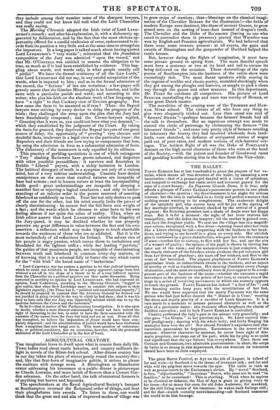AGRICULTURAL ORATORY.
Tax imagination loves to dwell upon what is remote from daily life. Town ladies read about rustic beauties, and country milliners de- light in novels of the Silver-fork school. After-dinner oratory has in our day taken the place of winter gossip round the country-fire ; and, like that first-born of imaginative gabble, it strives to please the auditors with strange news. A Birmingham or Manchester orator addressing his townsmen at a public dinner is picturesque as Claude Lorraine, and more lavish of flowers than a Covent Gar- den salesman. On the other hand, the talk of oratorical farmers is of anything but beeves and haycocks.
The speechmakers at the Royal Agricultural Society's banquet at Southampton reversed the Scriptural order of things, and beat their ploughshares into swords. To listen to them, one would think that the great end and aim of improved modes of tillage was to grow crops of warriors ; that—blessings on the classical imagi- nation of the Chevalier BUNSEN for the illustration !—the fields of modern Europe were destined, like those of ancient Greece, to grow armed men on the sowing of bone-dust instead of dragon's teeth. The Chevalier and the Duke of RICHMOND (having no one who cared to contradict them in presence) proved that Waterloo was won by English and Prussian agriculturists. We had believed that there were some weavers present : at all events, the guns and swords of Birmingham and the gunpowder of Dartford helped the rustic heroes.
But, however daring the flights of imagination, it must have some prosaic ground to spring from. The most fanciful speech must have a sentence or two at its head and tail to excuse its being delivered on the occasion. These dovetailings of the epic poems of Southampton into the business of the cattle-show were exceedingly rich. The most fluent speakers while soaring in the regions of warlike and classic poetry, stumbled shockingly when they got among the ploughs and harrows, or sought to pick a clean way through the guano and other manures. In this department, Mr. PUSSY far outshone all competitors. His picture of Lord SPENCER marshalling the pigs and oxen was worthy of HOMER, or some great Dutch master.
The moralities of the evening were of the TRIMMER and HAN- NAH MORE school. The virtues of all who have any thing to give were eloquently tricked out. Less than usual was said of " farmers' friends "—perhaps because the farmers' friends had all the talk to themselves. But an ingenious attempt was made to extend the circle of patronage by christening the farmers " the labourers' friends " ; and some very pretty idyls of farmers retailing to labourers the bounty they had received wholesale from land- lords, were sketched, in defiance of antiquated stories of wages paid out of poor-rates, and modern notions of rick-burners' cot- tages. The boldest flight of all was the Duke of PORTLAND'S descant on the high moral character of those who were at the head of the Society,—with the patron and founder of Goodwood races and gambling-booths staring him in the face from the Vice-chair.


























 Previous page
Previous page